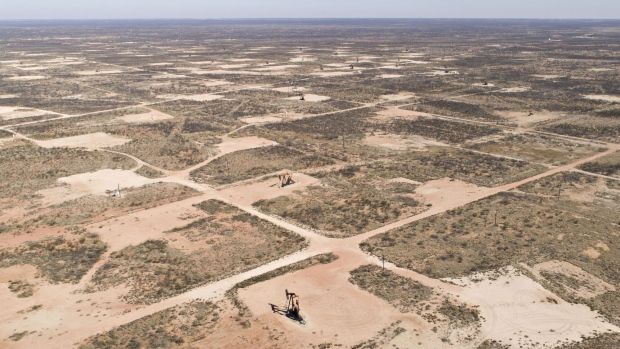Oct 7, 2023
Exxon’s Blockbuster Pioneer Merger Needs Biden’s Blessing First
, Bloomberg News

(Bloomberg) -- Exxon Mobil Corp. needs approval from the Biden administration before it can take over independent oil and gas producer Pioneer Natural Resources Co. in what would be the world’s biggest deal this year. That might not be such an easy task.
The US Federal Trade Commission is expected to give the deal, which could be worth as much as $60 billion, a tough look amid the Biden administration’s crusade to clamp down on gasoline prices that have touched on new highs in recent months. President Joe Biden himself has asked the commission to investigate high gas prices and singled out Exxon’s record profits, which surged to $59 billion last year, accusing the company of making “more money than God.”
“This is not exactly a friendly administration,” said Roth MKM analyst Leo Mariani, adding the deal would make Exxon “the largest player” in the area. It’s “the Biden administration versus oil and gas.”
Exxon is still in talks over the transaction, which hasn’t been finalized. A deal with Pioneer would represent Exxon’s largest takeover in more than two decades and its biggest since it merged with Mobil Corp. in 1999. The move would unite two of the biggest acreage holders in the Permian Basin of Texas and New Mexico, making Exxon by far the formation’s dominant oil producer with an output of about 1.2 million barrels a day — more than many OPEC nations. It would also extend Exxon’s inventory of top-tier drilling locations in the basin by decades, providing low-cost, low-risk crude well beyond 2050 to feed its giant refinery network on the Gulf Coast.
Read more: Exxon Nears Takeover of Pioneer, Its Biggest Deal Since 1999
While oil and gas industry deals rarely drew additional antitrust scrutiny in the past, the FTC started taking a closer look at some of them starting in the fall of 2021, when Biden’s pick Lina Khan took over the agency as chair.
“This will get a close look by the FTC,” said Diana Moss, who is vice president and director of competition policy at the Progressive Policy Institute and specializes in antitrust in energy markets. “They absolutely will poke into this.”
Moss said the Permian Basin is at peak drilling activity and well counts with about 50 companies drilling in the basin. Pioneer is the largest in terms of well counts and barrels per day. She said the FTC is likely to be interested in the dominant position of the combined firm and whether the tie-up increases the likelihood of coordination with the remaining players.
A combined Exxon-Pioneer would have “a market share more than double the next largest rival” in the Permian Basin, she said. With its intensified focus on labor markets, the FTC may also scrutinize how the deal impacts specialized workers such as geologists and petroleum engineers.
The agency conducted an in-depth investigation of private equity firm EnCap Investments LP’s $1.5 billion acquisition of oil and gas producer EP Energy, requiring the companies to sell all of EP’s assets in Utah in March 2022 to obtain antitrust approval.
The FTC also closely scrutinized EQT Corp., the largest US natural gas producer, over its $5.2 billion deal to acquire THQ Appalachia I LLC, a gas producer backed by Quantum Energy Partners, which would become EQT’s largest shareholder and have a seat on EQT’s board. The deal also included XcL Midstream LLC, which owned about 95 miles (153 kilometers) of gas pipelines.
The antitrust agency required Quantum to give up the board seat in August, but otherwise allowed the deal to move forward.
Chevron Corp. announced a $6.3 billion acquisition of PDC Energy in May 2023. The deal added to Chevron’s assets in Colorado, plus additional acres in the Permian Basin. The FTC declined to conduct an in-depth probe of the deal, and the merger closed in August.
In 2022, the five biggest players — Chevron, ConocoPhillips and Occidental Petroleum Corp. along with Exxon and Pioneer — account for 41.3% of oil production in the Permian Basin, according to Fernando VAlle, an analyst with Bloomberg Intelligence.
Investment in finding and developing fossil fuels has declined in recent years, especially since the pandemic forced oil majors to rein in spending, slash costs and borrow billions of dollars to pay shareholder dividends. Exxon’s profits surged in 2022 as energy prices jumped following Russia’s invasion of Ukraine. Its stock gained more than 80% last year, providing the financial firepower for a potentially era-defining deal with Pioneer.
“The oil industry has made it clear that they do not want to invest in production, despite high prices,” said Matt Stoller, director of research for American Economic Liberties Project. “Consolidation will make it even easier for them to reduce output and increase prices, which are classic symptoms of reduced competition. Enforcers should investigate this acquisition very carefully.”
Located in western Texas and southeastern New Mexico, Permian, the western hemisphere’s most-prolific oil field, produced 5.65 million barrels of oil per day in the first quarter of 2023, according to statistics compiled by the Dallas Fed. The area accounted for 43.6% of US oil produced in 2022, up from 18.1 percent in 2013, according to the Dallas Fed.
--With assistance from David Wethe.
©2023 Bloomberg L.P.


